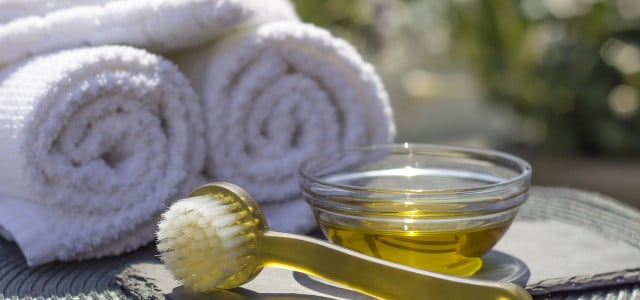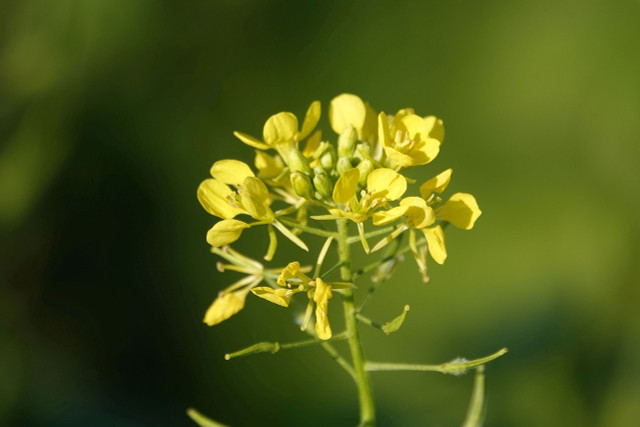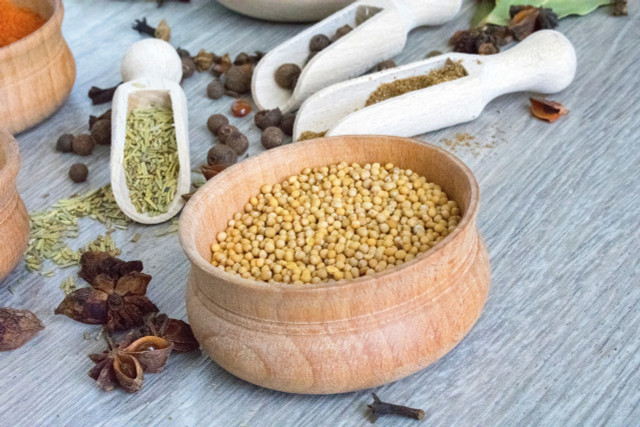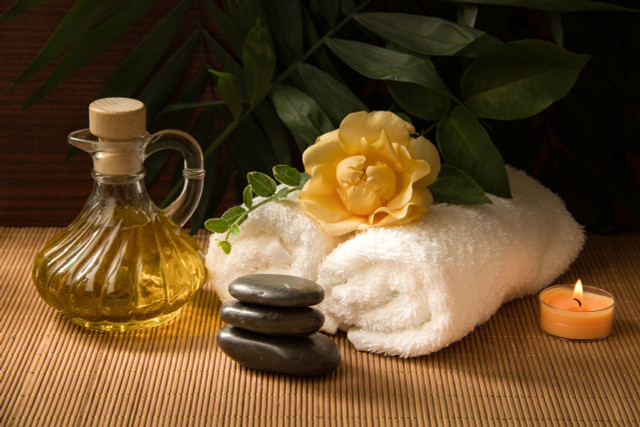
Mustard oil is considered an effective medicinal oil thanks to its pungent essential oils. It only has its effect in water; without water it is a cooking oil like any other.
Mustard oil is made from the cold-pressed oil of mustard seeds. The seeds and grains contain essential oils that give the mustard a spicy taste. These essential oils are also found in horseradish, radishes and cress.
The mustard plant originally comes from Asia and came to Europe in the late Middle Ages. Mustard oil is still a widely used cooking oil in India today. Traditional Indian medicine, Ayurveda, also uses the pungent essential oils in mustard oil for healing massages.
The mustard oil itself is not spicy and even tastes a bit bland. Only when mixed with water does it produce the typical spicy taste that we know from mustard.
Mustard oil contains many fatty acids and also essential oils

(Photo: CC0 / Pixabay / Uschi_Du)
Mustard oil contains a variety of fatty acids:
- It consists mostly of simple, unsaturated fatty acids.
- But it also contains the essential polyunsaturated fatty acids – both omega-6 fatty acids (linoleic acid) and omega-3 fatty acids. Both together are important for a healthy immune system.
However, mustard oil also contains the controversial fatty acid erucic acid. The Federal Institute for Risk Assessment warns of possible harmful effects on health at higher concentrations of erucic acid in cooking oil, for example fatty heart disease. However, the EU Commission has set a maximum permitted level in the EU regulation. Therefore, when buying mustard oil, make sure that it is approved as a food in the EU.
You can buy organic mustard oil from Germany or Austria in well-stocked organic markets. Or you can order it online from organic oil mills, such as Ölmühle Solling or from Amazon.
https://www.presseportal.de/pm/7139/4907129
Mustard oil: How to use it for cooking

(Photo: CC0/pixabay/Enotovyj)
You can use mustard oil in the kitchen like any other cooking oil. It can withstand high temperatures very well, so you can use it for frying or deep-frying. However, the heat causes the essential mustard oils to break down and the oil loses its spiciness.
Unlike heating olive oil, for example, mustard oil only produces gases that are harmful to health at temperatures of around 250 degrees. This smoke is suspected of being carcinogenic.
You can use cold mustard oil in the kitchen as follows:
- Indian curry dishes in particular get their typical taste from mustard oil.
- The cold oil gives sauces or dips a spicy note.
Moist mustard oil compresses help with colds
Mustard oil is said to have healing properties. The essential oils are said to be released primarily through contact with water. You can use mustard oil externally for massages, baths, foot baths or wet compresses.
Moist compresses made from mustard oil are a home remedy that is said to help relieve certain illnesses. Be careful, though: the mustard oil can make the skin red, feel hot or tingle. This is because the blood flow to the skin is very high. If the skin itches uncomfortably, burns or even swells, remove the compress immediately.
You can treat colds specifically with neck or chest compresses. At the same time, you inhale the essential oils from the moist compress. Your nose will clear and the mucus in your throat or bronchi will dissolve.
- Use one to two tablespoons of mustard flour and a sheet/muslin diaper/kitchen towel.
- Spread the mustard flour on the cloth and dip it in 50 degree warm water.
- Place the wrap on your chest for a maximum of ten minutes.
- To protect your nipples from the intense mustard oil, you can rub them with Vaseline or another greasy cream beforehand.
Mustard oil as a hair mask

(Photo: CC0/pixabay/)
The linoleic acid in mustard oil is also a component of the skin. This means that the skin easily absorbs the mustard oil during a massage. The linoleic acid in the skin cells regulates the fat and moisture balance. After a massage with mustard oil, your skin looks fresh and rosy.
Mustard oil is often recommended as a remedy for cellulite. But be very careful when using mustard oil. Don’t let oils work for too long. You can get serious burns from mustard oil, as the medical journal describes.
Hair treatment with mustard oil:
- Mustard oil is said to stimulate hair growth if you massage the scalp with it. The essential oils in mustard oil increase blood flow to the hair roots and supply the scalp with nutrients.
- For brittle, dry hair, massage mustard oil into dry hair and scalp. Leave the mixture on for about 15 minutes and then wash it out with a mild organic shampoo.
Mustard oils, the natural antibiotic
Doctors are increasingly relying on the natural effects of mustard oils to treat bacterial or viral infections. The mustard oils in horseradish and cress are mainly used. The University of Freiburg even conducted promising studies in which mustard oils were used against the dreaded hospital germs (MRSA).
Researchers at the Kurpark-Klinik Bad Nauheim have discovered in a study analysis that the mustard oils in nasturtium and horseradish can be used as a herbal treatment option for uncomplicated cystitis.
Read more on Techzle\.com
- Olive oil for hair: this is how natural hair care works
- Thyme oil: Effects and use for colds and more
- Massage oil: Relax naturally with homemade massage oil
Edited by Nora Braatz
** marked with ** or orange underlined Links to sources are partly affiliate links: If you buy here, you are actively supporting Techzle\.com, because we then receive a small part of the sales proceeds. .